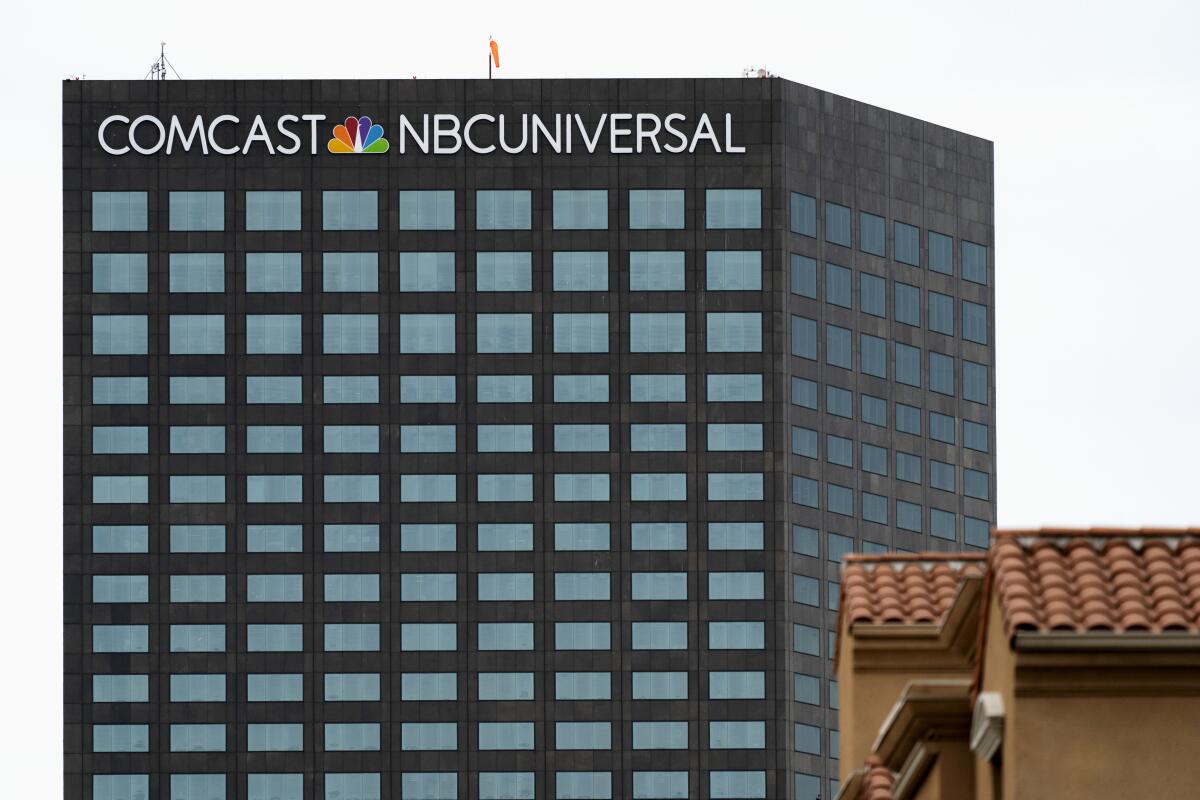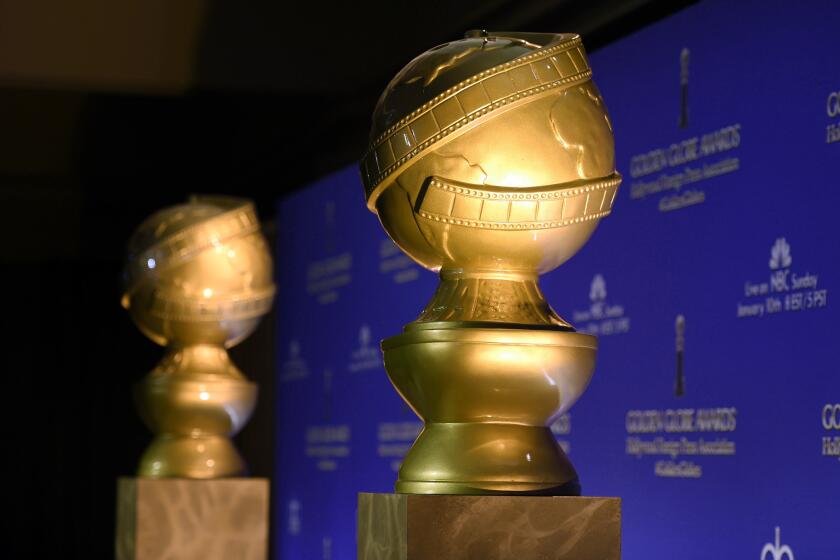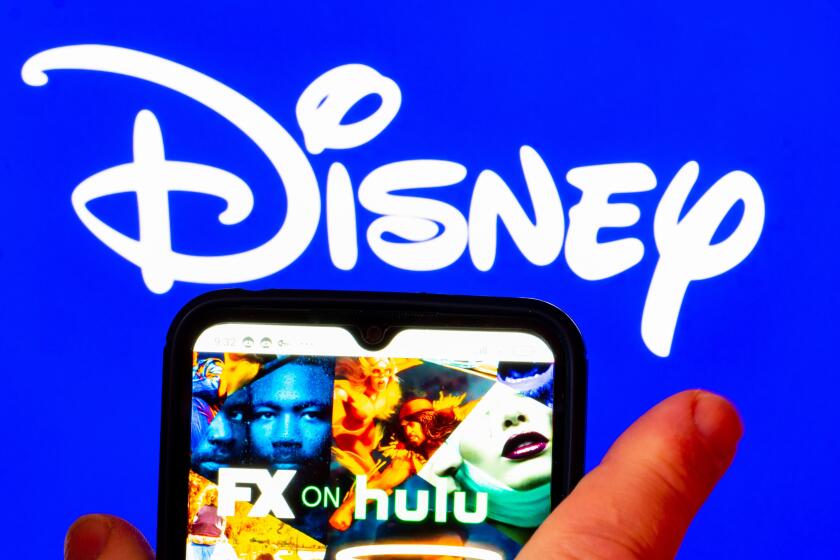Behind NBC’s decision to put the Golden Globes on ice for a year

- Share via
Throughout the scandal swirling around the Golden Globe Awards show, longtime broadcaster NBC appeared flat-footed — seemingly unprepared to tackle the crisis that was consuming one of its biggest live TV events.
Since late February, the Hollywood Foreign Press Assn., the group that owns the lucrative Golden Globes franchise, has been at the center of a furor over alleged ethical lapses, self-dealing and a lack of Black members — revelations that surfaced in a Los Angeles Times investigation.
NBC, which has broadcast the Golden Globe Awards show annually since 1996, was slow to recognize the intensity of the highly charged atmosphere over race and diversity and the level of frustration that existed among producers and publicists who had chafed for years under the demands of the free-wheeling group of 86 foreign journalists who vote on the Golden Globes. NBC also was stunned by the speed in which Hollywood turned on an awards show it had long embraced.
The Times’ report prompted much debate within NBC over its role and the future of the Golden Globes, according to interviews with several knowledgeable insiders. NBC executives said they took the concerns seriously, but felt hamstrung by their lucrative business entanglements.
Although NBC declined to comment for this story, several company executives now privately acknowledge they made several public relations miscalculations.
Hollywood players continue to back away from the Hollywood Foreign Press Assn., with Warner Bros. joining Netflix and Amazon Studios in cutting ties.
Instead of taking a leadership role, the venerable broadcaster’s hand ultimately was forced by prominent producers Shonda Rhimes and Ava DuVernay, A-list actors Mark Ruffalo and Scarlett Johansson, the Time’s Up organization, a coalition of publicists and rival streaming giants Netflix and Amazon Studios.
Facing an embarrassing boycott of next year’s awards show by much of the industry, NBC announced Monday that it was pulling the plug on the 2022 Golden Globes telecast to give the HFPA, which was formed in 1943, time to carry out a series of planned reforms.
“NBC should have been leading the charge to demand reform and improvement,” said Shawna Kidman, a communication professor at UC San Diego. “But NBC lost the narrative. They allowed these new companies, like Netflix and Amazon, to come in and take a stand for diversity and change and it seemed like the old media companies, like NBC, didn’t care about diversity and change — even if that’s not true.”
NBC’s stance was complicated by several factors, chief among them the eight-year, $500-million TV rights deal for the Golden Globe Awards that NBC signed in 2018, according to the knowledgeable insiders. NBC’s contractual arrangement is not with the HFPA — even though the organization’s operations are financed by the rights fees from NBC.
Instead, the TV network’s relationship is with Dick Clark Productions, which produces the annual awards show on behalf of the HFPA. Dick Clark Productions has a vested financial interest because it reaps roughly half of the more than $60-million annual license fee that NBC is obligated to pay through the 2026 awards show. Dick Clark Productions is owned by the powerful independent TV and film studio MRC (Media Rights Capital), which also produces Netflix’s “Ozark” and live shows such as “Dick Clark’s New Year’s Rockin’ Eve With Ryan Seacrest.”
NBC executives and their lawyers quickly decided they didn’t want to come across as heavy-handed with longtime business partners, insiders said. They also realized that for change to come about, the network needed to work alongside Dick Clark Productions/MRC and the HFPA.
Early on, a decision was made for NBC to stay mum and work collaboratively behind the scenes. But by saying nothing about the controversy, NBC looked frozen as one of its marquee assets was falling apart.
Some executives within NBC wanted to find ways to preserve the popular awards show, which has long been a platform to showcase NBC’s stars, including Tina Fey and Amy Poehler, along with the rest of the Hollywood glitterati.
But within NBCUniversal there has been considerable debate among senior executives about whether the Golden Globes can be salvaged.
Even before this year, the network was frustrated by the contract it signed in 2018. Since then, NBC management has changed and a new group of executives — led by NBCUniversal Chief Executive Jeff Shell and a troika of TV lieutenants — is in charge. None of those executives were involved in negotiating the 2018 deal, which came with a huge increase in fees.
In the prior deal, NBC paid about $25 million a year for the TV rights for the Golden Globes — and the show was hugely profitable.
Not any longer. The show has become a money-loser for NBC.
Earlier this year, NBC demanded a roughly $20 million rebate on the license fee that it paid this year, according to two people familiar with the situation. Because of the pandemic, the Feb. 28 broadcast turned into a T-shirt and Zoom affair rather than a boozy party in the star-studded ballroom of the Beverly Hilton — a spectacle that has long delighted TV viewers.
NBCUniversal executive Craig Robinson acknowledged the network’s leadership role in spurring HFPA reforms: ‘We are using [our] influence.’
As expected, ratings plummeted more than 60% compared to the 2020 awards show. According to Nielsen, about 7 million viewers tuned in to the 78th Golden Globe Awards telecast, an all-time low for NBC, versus 18.4 million last year.
In early March, a week after the show, Time’s Up representatives met with NBC to demand reforms to the HFPA.
“We emphasized to them what we thought was the depth of the problems and the importance of the urgency,” Time’s Up President and CEO Tina Tchen said this week. (The HFPA declined to meet with Time’s Up.)
By mid-March, NBCUniversal Executive Vice President and Chief Diversity Officer Craig Robinson responded to the mounting criticism, saying, “Our perceived silence on this should not be equated with apathy or a lack of concern.”
Rival TV executives privately acknowledge that NBC executives were in an awkward spot. The network couldn’t lash out at long-term partners, particularly because the HFPA’s foibles had been documented for years. Indeed, in 2010, NBC’s sitcom “30 Rock,” created by Fey, had a storyline that revolved around trying to bribe HFPA members.
In many ways, NBC’s hands were tied. There was no so-called “morals clause” in the contract that would enable NBC to bail before the agreement expires in 2026, according to two executives familiar with the agreement but not authorized to comment. Such clauses are typically used in contracts with individuals, not groups such as Dick Clark Productions or the HFPA.
“There’s been no discussion of moving [the show] from NBC,” said an executive at Dick Clark Productions who was not authorized to comment publicly. “They’ve been great partners and we’re all pushing for the reforms. We all want to see that.”
Meanwhile, NBC executives also were smarting over what they viewed as hypocrisy by publicists, studios and streaming services who had long tolerated and coddled the HFPA only to express outrage at the group’s practices. Publicists have countered that they have long warned their clients about HFPA members’ conduct during press conferences and that their complaints to the group’s president were ignored.
Kidman, the professor, said it was understandable that NBC felt burned.
“Everyone knew there were problems with this group but yet they supported it for years and years, because their relationships with the Golden Globes were mutually beneficial,” Kidman said. “Then, all of a sudden, Netflix and Warner Bros. and others began pretending that they got a conscience.”
NBC must be held to a higher standard, Time’s Up Tchen said, because without NBC there would be no Golden Globes.
“Look, the HFPA is like a private club. ... except [for] the platform that NBC gives to the Golden Globes,” Tchen said. “It has become an institution that judges the rest of Hollywood.” Further, she added, “NBC is the entity that’s giving them the platform, that’s giving them the money, that’s giving them the broadcast platform to have that outsized impact on not just Hollywood but on our broader American culture.”
For weeks, NBC encouraged the HFPA to draft a list of reforms, which the group submitted last week. NBC released a statement a day later, saying: “We believe that the plan presented charts a course for meaningful reform at the HFPA.”
NBC was blindsided by Hollywood’s overwhelmingly negative reaction. Time’s Up blasted the plan, labeling it “sorely lacking and hardly transformational.” Netflix co-CEO Ted Sarandos weighed in, saying the streaming giant would boycott the HFPA and Golden Globes until the group came up with a plan to “tackle the HFPA’s systemic diversity and inclusion challenges [and implement] clear standards for how your members should operate.”
Once again, NBC seemed out of step with industry progressives. “We looked mealy-mouthed,” one NBC insider said candidly.
On Monday, NBC said it was abandoning the show for one year. But the reality was that without the publicists, Netflix, Amazon and HBO, which had all said they would boycott, there was little chance of putting on a show.
“Change of this magnitude takes time and work, and we feel strongly that the HFPA needs time to do it right,” NBC said. “We are hopeful we will be in a position to air the show in January 2023.”
But it’s unclear whether the Golden Globe Awards show will come back after its one-year hiatus.
Aside from waning viewership of awards shows, another sore point is that programs that air on the broadcast networks — NBC, CBS, ABC and Fox — have been winning fewer awards. In some cases, award shows have become a three-hour commercial for HBO, Netflix, Hulu and Amazon.
“Stars are so much less important than they were just a few years ago,” Kidman said. “Without these awards shows, they are going to become even less important.”
Staff writer Josh Rottenberg contributed to this report.
More to Read
Inside the business of entertainment
The Wide Shot brings you news, analysis and insights on everything from streaming wars to production — and what it all means for the future.
You may occasionally receive promotional content from the Los Angeles Times.











